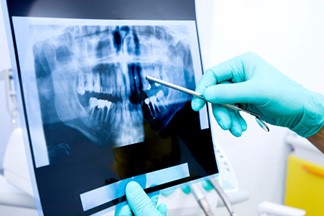Dental Exam | Routine Teeth Cleanings | Fillings | Tooth Extractions
 Dental Exam
Dental Exam
When you arrive for your first visit, please be prepared to complete all insurance and health information forms that will allow us to begin your dental treatment. We will ask you to fill out several forms that will get you acquainted with our office.
Your initial exam will last approximately one hour. Your dentist will thoroughly exam your teeth and gums, specifically looking for any potential problems. Depending on the patient, X-rays may be taken. If there are any signs of decay or other problems, your dentist will recommend treatment options and make notes of any conditions that may need future observation. Oral hygiene instructions will also be provided along with suggestions to help you care for your teeth. In most cases, we will also clean your teeth on this visit.
Routine Teeth Cleanings
Annually, you should schedule a routine dental cleaning. During this visit, one of our dental hygienists will remove plaque from your teeth, especially from places where your brush can't reach, such as underneath the gum line and in-between teeth. We will then clean your teeth and apply fluoride to help protect your teeth once you leave the office.
Fluoride is a relatively recent but important advancement in dental and oral health. Studies consistently show that a moderate but consistent exposure of teeth to fluoride helps strengthen and rebuild tooth structure, and helps prevent future decay.
If you are due for your annual dental cleaning, please call our office to schedule an appointment.
Fillings
The concept of a "filling" is replacing and restoring your tooth structure that is damaged due to decay or fracture with a material. We offer both amalgam (metal) and composite (tooth colored) fillings to help restore your tooth. The location, type of cavity and patient expectations will help determine which type of filling would be most suitable for you.
Silver Amalgam Fillings - Metal fillings (also known as mercury fillings) are made from strong and durable materials that can withstand the forces applied to the teeth while chewing. They are not made for aesthetics and can make the surrounding tooth structure appear discolored. Generally, silver amalgam fillings are used for the back teeth as they are more durable for the chewing surfaces of your teeth.
Composite White Fillings - Tooth colored fillings are ideal for patients wishing to maintain the natural beauty of their smile. Composite fillings are closely matched to the natural color of your teeth and bond well to the tooth. While not as strong as metal fillings, tooth colored fillings are durable and should last up to 6-12 years. Composite fillings are usually used on the front teeth offering optimal aesthetics.
We will work with each patient individually to determine which type of filling would be best for you.
Tooth Extractions
General Extractions
An extraction is the complete removal of a tooth. Extractions are sometimes necessary if a primary tooth is preventing the normal eruption of a permanent tooth, if the tooth has suffered extensive tooth decay or trauma that cannot be repaired, if the patient has gum disease, or if the tooth is impacted (usually the wisdom teeth). Depending on the complexity of the case, an extraction can be performed surgically or non-surgically. A mild anesthesia is used to ensure your child is as comfortable as possible throughout the procedure.
Wisdom Teeth
Your third molars are more commonly called "wisdom teeth." Usually appearing in the late teens or early twenties, third molars often lack the proper space in the jaw to erupt fully or even at all. This common condition is called impaction.When any tooth lacks the space to come through or simply develops in the wrong place of your jaw and becomes impacted, problems can arise. Primarily, damage to adjacent teeth and crowding occur.
In certain cases, the wisdom tooth that cannot come through becomes inflamed under the gums and in the jawbone, causing a sac to develop around the root of the tooth that then fills with liquid. This can cause a cyst or an abscess if it becomes infected. If either of these situations goes untreated, serious damage to the underlying bone and surrounding teeth and tissues can result.
To potentially stave off this result, an extraction of one, several or all of the wisdom teeth may be advised. If that is the case, we have the equipment and training needed to perform such extractions, with an absolute minimum of discomfort. Ask our staff for more information regarding tooth extractions if you feel you may need one.
